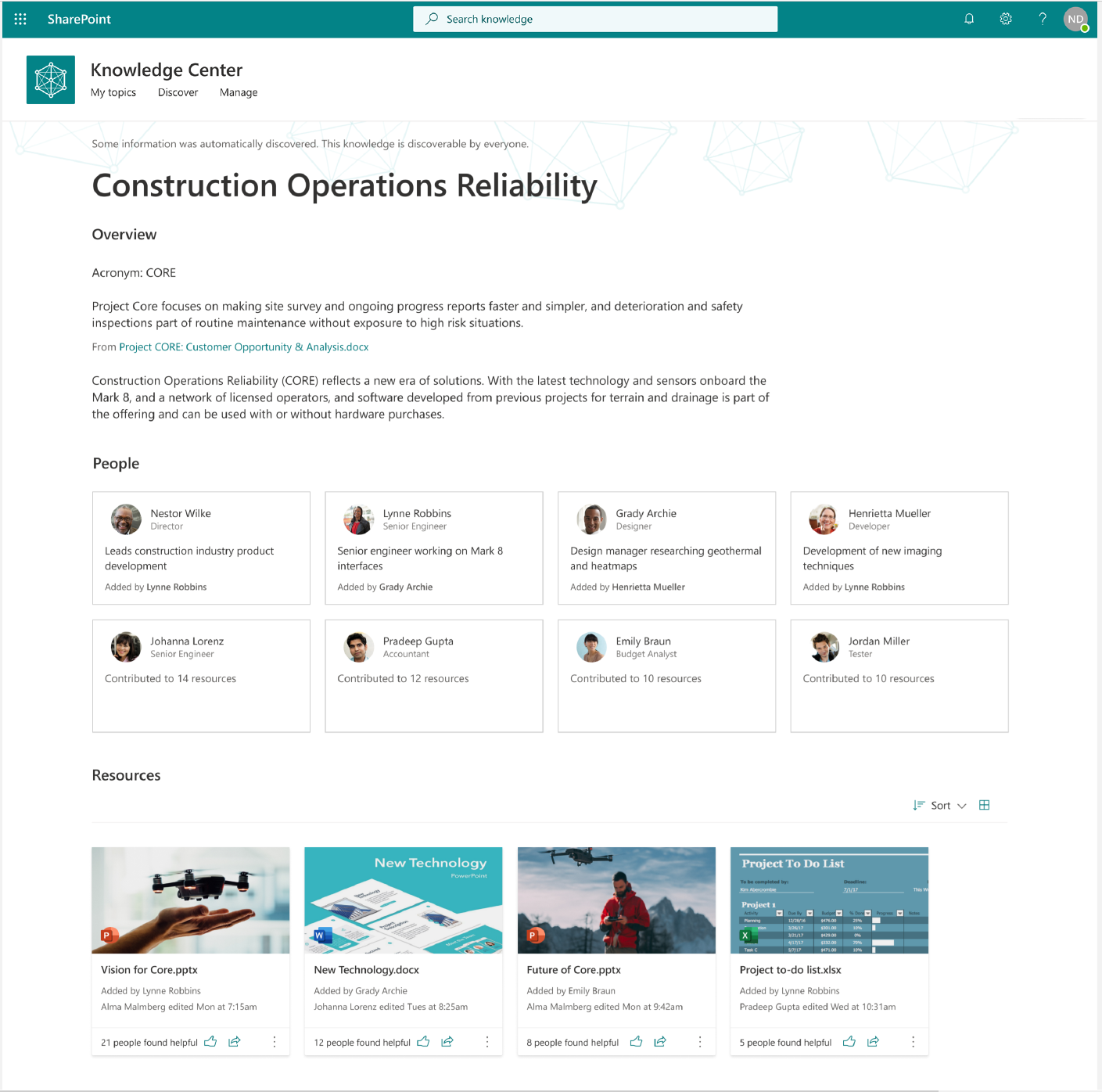Project Cortex and why it matters
There is huge buzz in the Microsoft community about a new offering coming to Microsoft 365 this year.
It’s code named “Project Cortex.” It aims to integrate everything Microsoft has to offer, around Networking and Relationships, Search, Security, AI (Artificial Intelligence), and Records Management, to bring a unified solution to automate your work life. It promises to not only automatically tag content, but also to use AI to organize topics.
The heavy-lifting with metadata
Our services at Gravity Union are to provide clients with an easy to follow process to migrate into an electronic content management (ECM) platform, namely SharePoint, while providing governance and compliance best practices.
Through implementing SharePoint for our clients, we hear concerns around search and compliance. In order to be successful in implementing SharePoint as an ECM platform, we need users to enter metadata, or columns, for documents they upload or work with. They need to tag the vendor, project name, expiry date, and many other forms of metadata to tie documents and information together. This helps with search and allowing record managers to accurately determine retention periods of these content.
We all begin with great intentions of how users will fill out all this information, but in reality there is a gap. End users are notoriously bad at adding metadata terms because it takes time, and the benefit is not clear. When there is no direct benefit in how users do their work, there are more chances of metadata not being filled. Furthermore, when users are mostly using Teams or OneDrive sync'd libraries to do their everyday work, metadata is not an option to add.
At the end of the day, adding content types, metadata, taxonomies and terms are not natural human activities.
The Project Cortex promise
We understand how crucial metadata is, so we here at Gravity Union are super excited about Project Cortex, and what it offers our clients. It promises:
To automatically tag an organization’s content, including documents and videos
Use AI to organize your content into a knowledge network of shared topics like projects and customers
This is a game changer! Not only will Project Cortex be able to automatically tag metadata, it can also understand relationships of how we do our work and create a web of how knowledge is tied together in your organization.
Visualization of the metadata and entities connected to a topic.
Image courtesy of Microsoft
How does it work?
People will be able to use the model builder in Project Cortex to train the system to auto populate metadata by feeding it sample documents, such as invoices or contracts. The AI will be able to extract important information as metadata, such as vendors, dates, and amounts, so that the end user only needs to upload the document, and not have to worry about tagging the information.
In this example, the information highlighted will be pulled from the document and populated into metadata:
Highlighted information is used to train the model to pull out the metadata.
Image courtesy of Microsoft
Project Cortex is not tied to only the Microsoft 365 world either. It will automatically mine data from both Microsoft 365 and external sources through over 110 connectors, and generate a knowledge network of topics and relationships, where it will bring knowledge and insights to all the apps you use in your everyday life, such as Teams, SharePoint, Yammer, and Outlook.
So, why does it matter?
This automation unlocks knowledge in your organization. Let’s say you have customer data in one place, policies and contracts about the customer in another, and project collaboration when working with the customer in another place. People rarely take the time to categorize, organize and tag the content it so it’s hard to search and find all data related to a customer. It’s also hard to know if people have worked with a similar customer before. Leaders in your organization might be answering the same customer-related questions over and over again.
With Cortex working behind the scenes to tag and organize content, it surfaces knowledge where people need it. For example, you can look something up related to a customer or project in Teams instead of flipping over to a search experience in another app:
Clicking on a ‘topic card’ generated by Project Cortex.
Image courtesy of Microsoft
A similar experience also works in Outlook, Word and SharePoint modern pages.
In SharePoint, a corporate Wikipedia-like experience brings information together into a knowledge center with topic pages. These topic pages automatically surface all relevant documents and people for a topic:
A SharePoint topic page which shows a combination of human curated content and People and Documents tagged by Cortex.
Image courtesy of Microsoft.
With the growing volume of data in most organizations, it’s harder than ever to understand and make use of information locked in different data sources. These content extraction capabilities have the potential to improve experiences such as on-boarding and unlocks the tacit knowledge in organizations.
“Better Together: People + AI”
We believe that Project Cortex and the associated experiences across Microsoft 365 will change how people interact, connect and view their organizations’ content. It will allow people within your organization to be empowered with AI as they work to help AI understand and organize your data within interfaces that are familiar. There’s always been a knowledge network within organizations, but typically it’s hard to see and hard to use. Project Cortex sets out to change that and put “knowledge in action.”
Next Steps
Currently Project Cortex is in Preview. General Availability is, as of this writing, in 2020 Q3. Licensing will be with a Premium SKU, with pricing to be announced later.
There are more details to work through including security, compliance and language support. We will share more about that in future posts. You can also stay up to date with everything Project Cortex in the Microsoft Project Cortex resource center.




